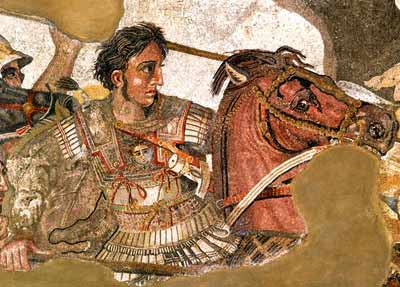
Everybody knows the Borza claim that Alexander’s trierarchs “are named according to their ethnicity”. Let's read what Professor Miltiades Hatzopoulos answer as about this Borza thought :
The list of the Macedonian trierarchs comprises at least two persons whose impeccable Greek “ethnicity” the American historian would readily recognise: Nearchos son of Androtimos and Laomedon son of Larichos hailing respectively from the Cretan city of Lato and the Lesbian city of Mytilene. Borza makes no mention of this difficulty in his comment on the list, but attempts to deal with the first case in a note referring to a different context, hesitating between casting doubts on the reliability of the list and on that of Nearchos’ origin. In fact, just as the presence of the “forgotten” category of the Cypriots contradicts the alleged binary opposition between Greeks on the one hand and Macedonians on the other, discrepancies such as the above belie the supposed “ethnic” character of the list and cannot be explained, unless the latter reflects “nationality”, “Staatsangehörigkeit”, rather than “ethnicity”.
Borza, who sets great store by the case of Eumenes’ handicap as an “ethnic” Greek, despite his long years in Macedonian service, could not convincingly argue that Nearchos and Laomedon and thousands of other Greeks from beyond Olympus ceased to be “ethnic” Greeks –whatever that may mean– when they settled in Macedonia.
The explanation of the presence of Nearchos and Laomedon in the Macedonian list is obvious: contrary to Eumenes, when they moved to Macedonia, they did not simply settle in the country, but became citizens of Amphipolis and ipso facto also of the Macedonian Commonwealth.
It is thus more than clear that the trierarchs are not “named according to ethnicity”. The classification is determined by political criteria. All citizens of Macedonian civic units are classified as Macedonians, whatever their origin.
Who then are the Greeks?
Medios son of Oxythemis from Larissa, Eumenes son of Hieronymos from Kardia, Kritoboulos son of Platon from Kos, Thoas son of Menodoros and Maiandros son Mandrogenes from Magnesia, Andron son of Kabeles from Teos.
Now, the home cities of these trierarchs share a common feature: they were all members of the Hellenic League (of which Macedon itself was no part), Larissa and Kardia from the time of Philip II, Kos and Magnesia and Teos since 332. On the other hand the kingdoms of Cyprus, which joined Alexander at the siege of Tyre, never adhered to the League officially styled as “the Hellenes”.
Also Professor Hatzopoulos says as about the ethnicity...
The word “ethnicity”, as already mentioned, is practically untranslatable in languages such as Greek, German or French, except as a calque from Engish. Its success in the latter language, and in particular in American English, is probably due to the shift in meaning of the term “nation” in a country without a long national tradition, which, instead of the people, came to be used for the “state”, causing the need for the creation of a new term. For a Greek the existence of an öθνος or for a German the existence of a “nation” is clearly independant from that of a state apparatus.
A closer look at other passages collected and adduced by Borza as supposedly revelatory of the –“ethnic” that is to say, according to him (vide supra), of the cultural– distinction between Greeks and Macedonians betrays similar difficulties and discrepancies. As M. B. Sakellariou has aptly stressed, the contrast and occasionally the antagonism between Greeks and Macedonians in the age of Philip and Alexander, of which the American historian makes so much, was political and had to a certain extent social causes.
Those who deny that the Macedonians were Greeks assert that they took the Greek names for gods, heroes, festivals, months and people from the Greeks. In the first place, however, there is no other example of a people neighbouring on the Greeks whose names were 95% Greek before the middle of the fourth century; many centuries later than this, a large percentage of Paionians, Thracians, Mysians, Lydians, Karians and Lycians had local names, even though they had begun to feel Greek cultural influences much earlier. Furthermore, a number of the Greek-sounding names given by the Macedonians to gods, heroes, festivals, months and persons do not occur outside Macedonia or areas in which Macedonians had settled.
source :PERCEPTION OF THE SELF AND THE OTHER: THE CASE OF MACEDON, Macedonian Identities, pages 61,62



No comments:
Post a Comment